
By
Leanna Seah
September 20, 2024
Updated
October 29, 2024

Overview
Kuwait is an oil-rich country located in the Persian Gulf. It's one of the most stable countries among Arab countries. It has a low unemployment rate, with plenty of job opportunities abound. However, due to its high foreign worker population, finding locals to fill positions can sometimes take time.
Kuwait's labour laws are governed by the Ministry of Social Affairs and Labor, which sets out all employment regulations in the country.
In the Persian Gulf, Kuwait is among the first countries to establish a higher education and research system, reflected in its literacy rate (96.46% as of 2020). The business climate in Kuwait is a healthy one. The country has a lot to offer foreign companies looking to establish operations in the Middle East. It remains a popular option among many migrant workers, providing them with valuable work experience and comfortable salaries.
The country's economy has been growing steadily since oil prices began rising again in 2014, allowing it to expand on infrastructure projects and consumer goods despite falling global prices for crude oil exports. Moreover, its GDP per capita is much higher than other countries in the region.
The top job opportunities in Kuwait include industries such as:
-
aerospace manufacturing
-
petroleum refining and distribution
-
petrochemicals production
-
construction materials manufacturing
-
pharmaceuticals manufacturing
-
food processing, manufacturing, and distribution
-
information technology services
-
business services
-
consumer electronics production
-
oil and gas extraction
-
advertising agencies
| Capital | Kuwait City |
| Languages spoken | Official languages: Arabic, English Other languages: French, Farsi, Hindi, Urdu |
| Population size | 4.46 million as of 2022 |
| Payroll frequency | Monthly |
| Currency | Kuwaiti Dinar (KD) |
| VAT | Under discussion in parliament |
Payroll and taxes
There are two types of taxes in Kuwait: income tax and social security contributions. To understand how they work and what they cover, it is essential to understand the difference between a “worker” and an “employee.”
A worker is anyone who earns a living by working in Kuwait. This includes people who own businesses and those who work for someone else. An employee is anyone whom a company hires to perform tasks regularly.
There is no personal income tax in Kuwait. For Kuwaiti employees, contributions are payable monthly by both the employer and employee under the Social Security Law.
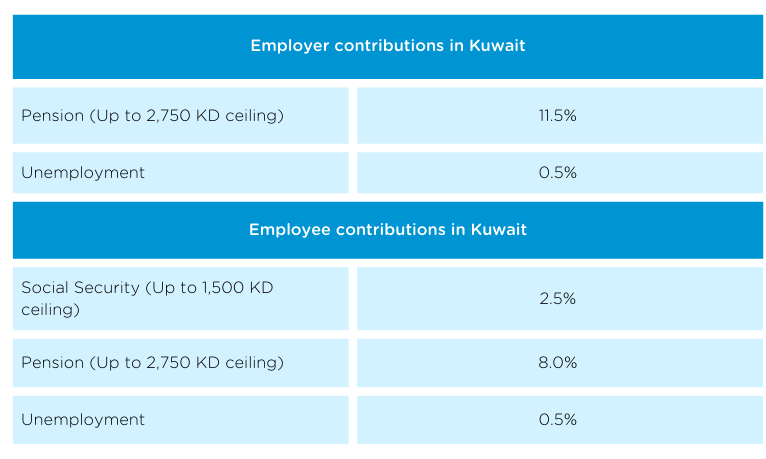 Table 1: Types of mandatory contributions from employers/employees
Table 1: Types of mandatory contributions from employers/employees
For expatriate employees, there are no social security requirements. However, terminal indemnity payments of 15 days' pay each year for the first three years of employment and two to three months’ salary yearly after that are usually required.
Working hours
Working week
The maximum workweek in Kuwait is 48 hours or six days a week at eight hours per day.
Working hours are shortened to six each day during the month of Ramadan.
After working five consecutive hours, employees are entitled to a one-hour break, which isn’t counted as part of the workday.
Overtime
Working on a Friday gives you 1.5 times your ordinary wage plus a compensating day off.
Working on a national holiday pays twice as much as a regular weekday.
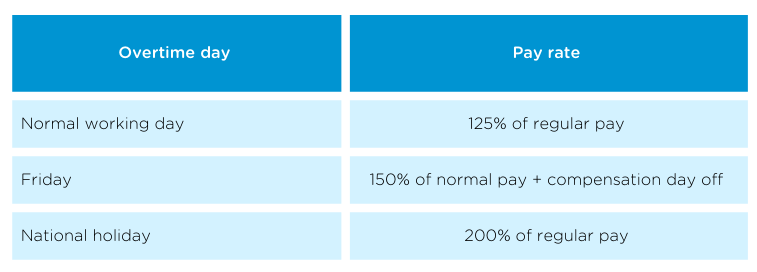 Table 2: Overtime hours and wage calculation
Table 2: Overtime hours and wage calculation
Minimum wage
Currently, the minimum wage in Kuwait is 75 KD per month and the range of salaries vary according to the job role of the employee and the industry they are working in.
Employee benefits
Mandatory benefits in Kuwait
- Minimum wage (as specified by the government)
- Annual leave entitlement (as specified by the government)
- Sick leave entitlement (as specified by the government)
- Public holidays (11 days per year)
- Annual leave (30 working days per year)
- Retiring age (55 years old for Public Sector)
- A medical card for each employee for all government hospitals and facilities.
Supplementary/optional benefits
- Housing allowance
- Education allowance
- Car allowance
- Transportation allowance
- Phone allowance
- Retirement Savings Plan (RSP)
- Employee Stock Purchase Plan (ESPP)
Healthcare benefits
Kuwaiti employers are not compelled by law to provide healthcare benefits to their employees. Many firms, however, offer them to attract and retain talent. Some of the most common choices are:
- Health Care Insurance
- Life Insurance
- Dental Insurance
- Accident Insurance

Types of leave available
Paid time off
For Muslim employees who are yet to perform the Hajj, a one-off leave of 21 days is provided to those who have completed two consecutive weeks of service with the same employer.
Public holidays
In Kuwait, eight public holidays are provided, with a total of 11 days off. 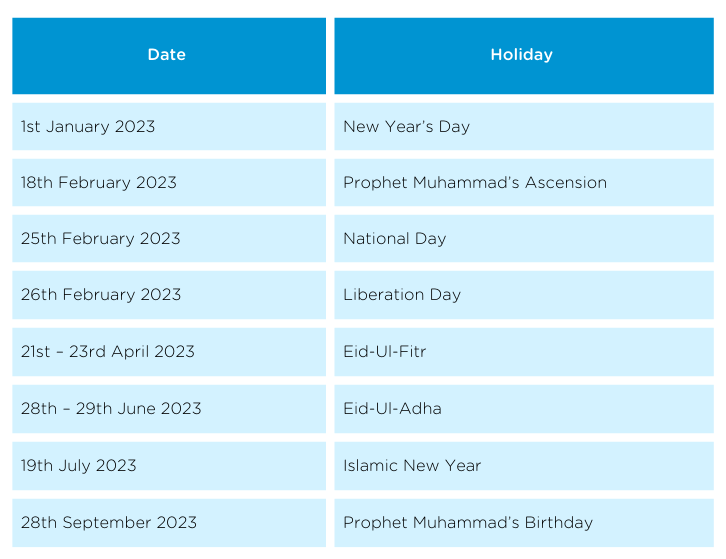 Table 3: National Public Holidays in Kuwait
Table 3: National Public Holidays in Kuwait
Sick leave
Those in service for at least a month are qualified to receive paid sick leave, provided a medical report from a qualified medical caregiver is furnished. The table below shows the rate employees are paid when they take sick leave:
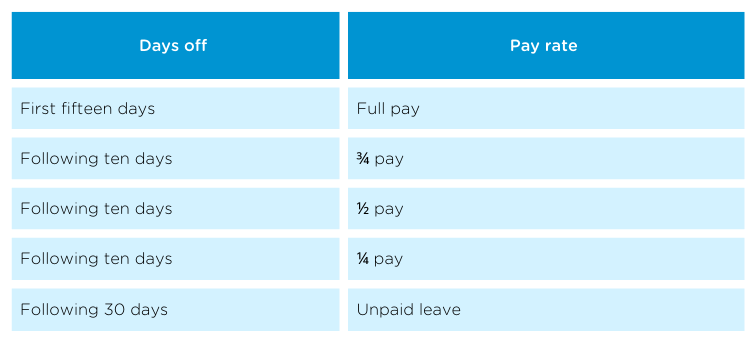 * This entitlement is for the entire year, not for each episode of illness.
* This entitlement is for the entire year, not for each episode of illness.
Table 4: Length of sick leaves and percentage of wages paid
Birthing leave
Pregnant employees are entitled to 70 days of paid birthing leave, which begins 30 days before the due date and ends 40 days after the birth. After completing their birthing leave, employees may seek up to four months of unpaid leave. After birth, the nursing parent is allowed up to two hours daily to nurse their child.
There is no statutory leave for the partners of birth-givers in Kuwait.
Employers with at least 50 women or 200 employees must provide daycare services to children aged four and under.
Other leave
For deaths of immediate family members, employees are entitled to 3 days of bereavement leave. Muslim women whose husbands have died are entitled to 4 months and ten days of fully paid leave, while non-Muslim women whose husbands have died are entitled to 21 days of fully paid leave.
Background checks
In Kuwait, background checks are not mandatory. However, some companies may require a background check for those seeking job opportunities with them. In these cases, The Data Privacy Protection Regulation applies when background checks are carried out.
Attracting talent
Kuwait is a country that has seen many changes over the last few years. The economy has seen growth and more employment opportunities, and the population is increasing rapidly.
With this increased demand for talent in Kuwait, comes the need for companies to focus on developing strategies to attract and retain top talent within their organisation.
Provide a diverse and inclusive work environment
Try to provide your employees with a safe, inclusive work environment. Inclusive workplaces are where everyone feels comfortable coming to work and being themselves, regardless of gender, sexual orientation, race, or other personal characteristics.
This can be done by promoting diversity and inclusion, encouraging open communication between employees and management, and promoting a positive work culture.
A diverse workforce helps your company expand its market and reach new customers. It can also help you attract and retain top talent by offering a positive environment where employees feel valued for their individuality. A study by McKinsey discovered that the top 25% organisations for racial and ethnic diversity are 35% more likely to have a greater return on investment.
Those in the top 25% for gender diversity get 15% higher returns. In the same vein, the BCG Diversity and Innovation survey discovered that companies with above-average diversity scores report an average of 45% innovation revenue, a stark contrast to the 26% reported by companies with below-average diversity scores. With Gen Z being the upcoming generation with the most diversity, it bodes well to pay attention to DEI measures.
Focus on developing leadership skills within their team
Working with your employees to develop their leadership skills can help them grow as individuals as well as improve your organisation's performance.
However, it is important to remember that different people will have unique needs; some people may feel comfortable when it comes to assuming leadership roles, while others might struggle more. Adapting your coaching methods to your employee's needs is vital to ensuring that everyone has the right tools to succeed.
Leadership training should focus on soft skills (how leaders interact with others) and hard skills (the technical abilities needed for the job).
An excellent place to start is by considering what sets influential leaders apart —and then consider how these characteristics apply within your organisation or team environment.
Offer competitive compensation and benefits
While many employees welcome salary increases, compensation should be fair and commensurate with the value that the employee brings to your company.
Since the pandemic hit, many employers have increased resources such as mental healthcare and childcare. Flexible working arrangements that were put into place during lockdowns, such as hybrid working arrangements and flexible workweeks, seemed to be beneficial to the majority of the workforce.
These are some of the perks that are attractive to the fresh, new talent pool.
Create work-life balance
A good work-life balance is essential for employees to feel comfortable at their jobs. It's vital in countries like Kuwait, where people are often expected to work long hours. Encourage employees to take time off by setting up well-structured vacation policies that include paid time off and flexible scheduling. This will help employees feel more relaxed about taking breaks from their jobs, which can lead to better work performance overall.
Include ways for foreign employees to get involved in international community activities or social events during their free time outside of work hours. Such activities give them personal fulfilment outside their professional lives and may even encourage them to think about developing new skills that align with these interests.
Encourage employee feedback, communication, and engagement
You can encourage employee feedback, communication, and engagement with these simple steps.
- Encourage employees to give feedback. This is the most crucial step in creating an open environment that fosters communication and engagement. If you want your employees to feel safe enough to communicate with each other, they need to know they have a voice in the company's business decisions. Giving employees a chance to provide their input on projects or campaigns will show them this respect and make them more likely to continue it when facing new challenges at work.
- Keep your channels of communication open across departments and teams so people have many opportunities to engage with one another throughout the week and not just during meetings scheduled at specific times every day or week (even if those meetings are with other departments or teams).
- Provide social media training and online tools so your team members can easily interact with each other whenever they're logged onto their computers instead of being tied down by physical proximity all day long.
Be the place that your ideal candidates want to work for
Today, people are increasingly focused on finding jobs with meaning and purpose. A high salary isn't enough; employees want to know what the organisation stands for and where it's going. They also want to be able to develop themselves as individuals and contribute their unique skillsets toward an overall goal or vision of success.
The first step is having a clear idea of what makes your company unique—what is it about the business that differentiates you from other companies? You can do this by answering questions like: Why should someone join our team? How would they learn something new at our company? What sets us apart from other employers in Kuwait?

Termination of employment
Employment contracts can be cancelled with no warning or pay if it is found that an employee:
- If the worker made an error that resulted in a significant loss for the company.
- If it was discovered that the worker got employment by deception or fraud.
- If the employee revealed institutional secrets that caused or would have caused significant losses.
Employment contracts can be cancelled with a notice under the following circumstances:
- If they are found guilty of a crime involving honour, trust, loyalty, and morals.
- If they did something against public morality on the job.
- If they assaulted one of their co-workers or their boss or the boss’ deputy while at work or for any other cause.
- If they violated or failed to comply with any of the contractual and legal responsibilities imposed on them.
- If it is discovered that they have frequently disobeyed the directives of the employer.
Employees may terminate their contracts without notice and still be entitled to their end-of-service benefits under the following circumstances:
- If the worker was assaulted by or provoked by the employer or their deputy.
- If the employer or his deputy violated the terms of the contract or the law.
- If continuing to work will risk the employee’s safety and health in accordance with the Ministry of Health's ruling.
- If at the time the contract was signed, the employer or their representative engaged in dishonest or fraudulent behaviour regarding the working circumstances.
- If the worker was cleared in the end after the employer accused them of committing a crime.
- If the employer or their representative behaves immorally toward the employee in relation to employment terms at signing the contract.
Severance pay 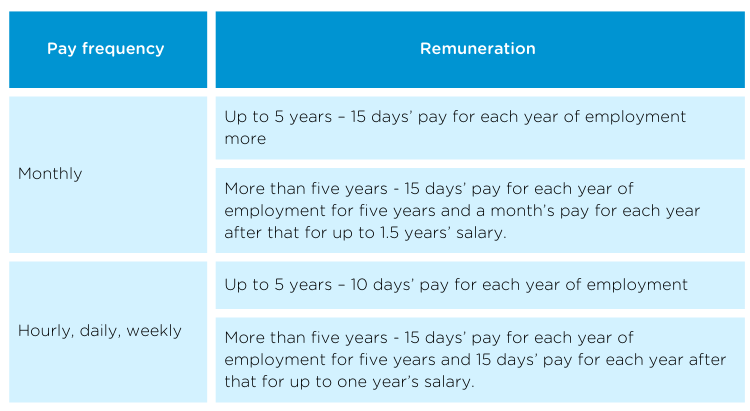 Table 5: Severance pay
Table 5: Severance pay
Probationary period
Notice period
Termination by employer/employee
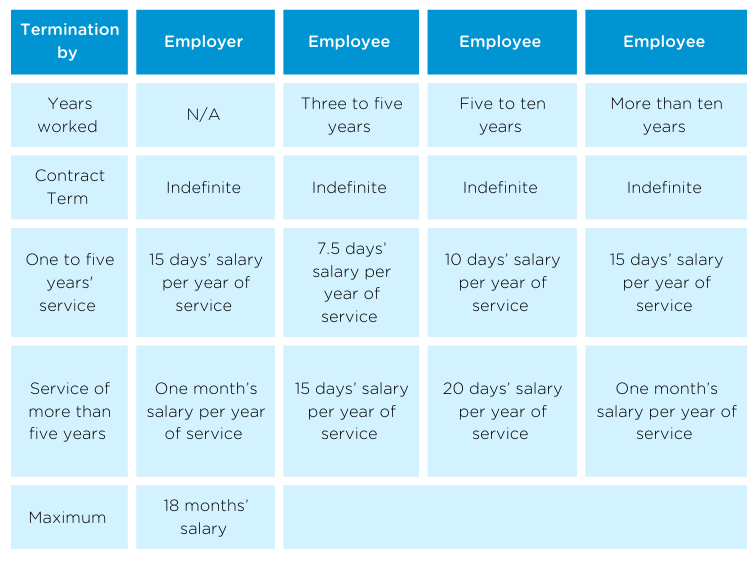
Table 6: End-of-service benefits calculation
Retirement
In a private company, there is no specific age of retirement mentioned. Expatriates who are 60 or above and who hold a high school degree or a lower educational degree can obtain the permit which will be issued for KD250 ($826). Workers must have full health insurance from one of the Kuwait-listed insurance companies. Expatriates who are above 60 years old and who hold University degrees can get their work permits renewed without any issue.
What are my options for hiring?
For organisations looking to recruit in Kuwait, Airswift offers a wide variety of options to make the hiring process easier while remaining compliant with local rules. With our extensive experience and understanding, we reduce the risks associated with hiring and onboarding the best talents Kuwait has to offer. While you focus on growing your business, allow us to handle your day-to-day administrative responsibilities.
Talent acquisition
When growing a business, there are always risks involved. That is why it is essential to have talents with relevant knowledge and skills. Airswift provides you with a local talent acquisition consultant to help you find high-quality candidates seeking job opportunities in a competitive market.
We also provide contract hires for short-term projects and flexible employment options, so you'll never have to sacrifice quality for urgent contract hires. Our database of highly qualified contractors assures that your organisation will have the finest talents available.
If you are looking for a more permanent solution, our professional recruiting services can link you with the greatest talents in the Kuwait area who fit your needs.
Employer of record
If you want to recruit individuals remotely but don't want a physical office, enlisting an employer of record in Kuwait may be the solution.
A third-party employer of record (EOR) allows you to bypass the trouble of establishing a local office and instead concentrate on running your business. They oversee activities such as paying employees' salaries and providing them statutory benefits.
*Although the information provided has been produced from sources believed to be reliable, no warranty, express or implied, is made regarding the accuracy, adequacy, completeness, legality or reliability of any information. For the latest information and specific queries regarding particular cases, please contact our team.

